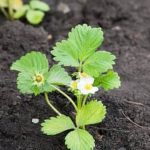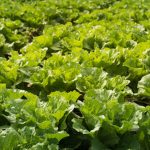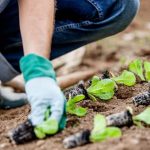Is your vegetable garden being overrun by pests? Do you want to keep your garden free of harmful chemicals? Look no further than pepper spray for vegetable gardens. This natural and organic pest control method can help you protect your precious plants without resorting to harmful chemicals. In this article, we will explore the importance of using pepper spray for vegetable gardens and how you can make your own homemade version using common kitchen ingredients.
When it comes to maintaining a healthy and thriving vegetable garden, dealing with pests is a constant challenge. However, using chemical pesticides can have detrimental effects on both the environment and our health. This is where pepper spray comes in as a safe and effective alternative. Not only is it natural and non-toxic, but it’s also readily available and easy to make at home.
In the following sections, we will discuss the benefits of using pepper spray for vegetable gardens, provide step-by-step instructions on how to create homemade pepper spray, offer tips on best practices for applying it to your plants, identify common pests that can be controlled with pepper spray, and explore alternative natural pest control methods.
By the end of this article, you’ll be equipped with all the knowledge you need to protect your vegetable garden from pests in an eco-friendly way.
Benefits of Using Pepper Spray for Vegetable Gardens
Pepper spray for vegetable gardens provides a natural and organic pest control method that offers numerous benefits. One of the main advantages of using pepper spray is that it is environmentally friendly and safe for both plants and humans. Unlike chemical pesticides, pepper spray does not harm beneficial insects such as bees and ladybugs, which play a crucial role in pollination and maintaining a healthy garden ecosystem.
Another benefit of using pepper spray for vegetable gardens is its effectiveness in repelling a wide range of garden pests. Whether you are dealing with aphids, caterpillars, or beetles, pepper spray can help deter these common garden invaders without causing any long-term damage to your vegetable plants. Additionally, pepper spray is easy to make at home using simple ingredients found in your kitchen, making it a cost-effective pest control solution for avid gardeners.
Furthermore, using pepper spray for vegetable gardens promotes sustainable gardening practices by reducing the reliance on synthetic chemicals that can have harmful effects on the environment. By opting for natural pest control methods like pepper spray, gardeners can contribute to creating an eco-friendly and thriving garden space. Overall, incorporating pepper spray into your gardening routine can lead to healthier vegetables and a more sustainable approach to pest management.
| Benefits of Using Pepper Spray | For Vegetable Gardens |
|---|---|
| Environmentally friendly | Safe for plants and humans |
| Effective in repelling various pests | Cost-effective and easy to make at home |
| Promotes sustainable gardening practices | Reduces reliance on synthetic chemicals |
How to Make Homemade Pepper Spray for Vegetable Gardens
Making your own homemade pepper spray for vegetable gardens can be a cost-effective and environmentally friendly way to keep pests at bay. Not only is it a natural and organic alternative to chemical pesticides, but it’s also easy to make using common kitchen ingredients. Below, we’ll provide you with step-by-step instructions on how to create your own pepper spray for your vegetable garden.
To make homemade pepper spray for your vegetable garden, you will need the following ingredients:
- 2-3 hot peppers (such as jalapenos or habaneros)
- 2 cups of water
- 1 tablespoon of liquid dish soap
- A blender
- A fine-mesh strainer or cheesecloth
- A spray bottle
First, put on a pair of gloves to protect your skin from the spicy peppers. Next, roughly chop the hot peppers and place them in a blender. Add the water and blend until the mixture has a smooth consistency.
Then, strain the pepper-water mixture through a fine-mesh strainer or cheesecloth into a bowl. Discard the solids and transfer the liquid into a spray bottle. Finally, add the liquid dish soap to the spray bottle and gently shake it to mix everything together.
When using homemade pepper spray for your vegetable garden, it’s important to apply it carefully to avoid harming your plants. Be sure to test a small area of your plants first to check for any adverse reactions before applying it more broadly. Additionally, apply the pepper spray early in the morning or late in the evening when temperatures are cooler to minimize any potential damage to your plants.
Overall, making homemade pepper spray for vegetable gardens is an excellent way to naturally deter pests without resorting to harmful chemicals. By following these simple steps, you can create an effective pest control solution that will help protect your vegetables and promote healthier growth without compromising environmental safety and health.
| Ingredients | Instructions |
|---|---|
| 2-3 hot peppers | Roughly chop and place in blender |
| 2 cups of water | Add to blender with peppers |
| 1 tablespoon of liquid dish soap | Add to spray bottle after straining mixture |
Best Practices for Using Pepper Spray in Vegetable Gardens
When it comes to using pepper spray for vegetable gardens, it’s important to follow best practices to ensure that your plants are effectively protected from pests without causing any harm to them. Here are some tips on how to apply pepper spray to your vegetable plants:
Best Practices for Using Pepper Spray in Vegetable Gardens
- Timing is key: It’s best to apply pepper spray early in the morning or late in the afternoon when the weather is cooler and the plants are not under direct sunlight. This helps prevent any potential damage to the plants due to heat stress.
- Test a small area first: Before applying pepper spray to all of your vegetable plants, test it on a small area and wait 24 hours to ensure that there are no adverse reactions. This will help you determine if your plants are sensitive to the spray.
- Even application: Make sure to evenly coat all surfaces of the plant, including the undersides of leaves where many pests like to hide. Use a fine mist sprayer for better coverage.
- Avoid spraying blooms: Be mindful of not directly spraying any flowers or blooms as this can affect pollination and potentially harm beneficial insects.
- Reapply as needed: After heavy rain or every 2 weeks, reapply pepper spray as needed to maintain its effectiveness in controlling pests.
By following these best practices, you can ensure that pepper spray is used effectively in your vegetable garden without causing harm to your precious plants.
Types of Pests That Can Be Controlled With Pepper Spray in Vegetable Gardens
When it comes to maintaining a thriving vegetable garden, pest control is essential to ensure the health and productivity of your plants. One effective method of pest control is using pepper spray for vegetable gardens.
Pepper spray can help manage and control various pests that may threaten the well-being of your vegetable plants. By identifying common pests and learning how to spot their presence in your garden, you can effectively use pepper spray as a natural and organic method of pest control.
Common Pests That Can Be Managed With Pepper Spray
There are several common pests that can be effectively managed using pepper spray in vegetable gardens. Aphids, caterpillars, spider mites, and whiteflies are just a few examples of pests that can wreak havoc on your vegetable plants. These pests can cause damage by feeding on the leaves, stems, and fruits of your plants, ultimately affecting their growth and productivity. By using pepper spray, you can deter these pests from infesting your garden while also avoiding the use of harmful chemicals.
Spotting Pest Presence in Your Garden
In order to effectively control pests with pepper spray, it’s important to be able to identify their presence in your garden. Keep an eye out for signs such as chewed or discolored leaves, webbing on plant surfaces, or visible insects congregating on your plants. Regularly inspecting your garden for these signs will help you catch pest infestations early on and take action with pepper spray before they cause significant damage to your vegetable plants.
Using Pepper Spray for Effective Pest Control
Once you have identified the presence of pests in your vegetable garden, it’s time to utilize pepper spray for pest control. By following best practices and applying the spray directly onto affected areas of your plants, you can effectively deter and manage common pests without harming the environment or risking the health of yourself or others who consume the produce from your garden.
Additionally, making homemade pepper spray using common kitchen ingredients provides a cost-effective and eco-friendly solution for managing pests in your vegetable garden.
Alternative Pest Control Methods for Vegetable Gardens
When it comes to managing pests in your vegetable garden, using pepper spray is just one of the many natural and organic pest control methods available to gardeners. While pepper spray can be an effective way to deter pests from your plants, there are other alternative methods that you can consider incorporating into your gardening routine.
Here are some alternative pest control methods for vegetable gardens:
- Companion Planting: This method involves planting certain herbs, flowers, or vegetables alongside your crops to repel pests or attract beneficial insects. For example, planting marigolds can help deter nematodes, while growing basil can help repel mosquitoes and flies.
- Row Covers: Row covers are lightweight, breathable fabric that can be used to physically block pests from accessing your plants. They allow sunlight and water to pass through while creating a barrier against insects and other pests.
- Beneficial Insects: Introducing beneficial insects such as ladybugs, lacewings, or predatory wasps into your garden can help control pest populations. These insects feed on aphids, caterpillars, and other harmful pests, helping to naturally keep their numbers in check.
In addition to these alternative pest control methods, there are also options such as using natural insecticidal soaps or neem oil sprays to manage common garden pests. By incorporating a combination of different pest control techniques and regularly monitoring your plants for signs of infestation, you can effectively maintain a healthy and thriving vegetable garden without relying solely on pepper spray for pest management.
Conclusion
In conclusion, pepper spray for vegetable gardens is a highly effective and natural method of controlling pests and maintaining a thriving garden. The benefits of using pepper spray include its organic nature, affordability, and ease of preparation. By utilizing common kitchen ingredients and following best practices for application, gardeners can effectively manage pests without causing harm to their vegetable plants.
It is important to remember that pepper spray can control a variety of common garden pests such as aphids, caterpillars, and spider mites. By identifying the presence of these pests early on and applying pepper spray as a natural pest control option, gardeners can prevent infestations and maintain the health and productivity of their vegetable plants.
For those who are interested in exploring alternative pest control methods for their vegetable gardens, there are numerous natural and organic options available. However, the simplicity and effectiveness of pepper spray make it a compelling choice for gardeners who want to maintain a thriving, pest-free garden without the use of harsh chemicals.
In summary, the use of pepper spray for vegetable gardens offers numerous benefits for gardeners who are looking for an organic and sustainable method of pest control. By considering the advantages of using pepper spray, learning how to make it at home, and applying it effectively in the garden, readers are encouraged to give pepper spray a try for maintaining a lush and healthy vegetable garden.
Frequently Asked Questions
How Do You Make Pepper Spray for Vegetable Plants?
Pepper spray for vegetable plants can be made by mixing hot pepper powder or chopped peppers with water and a few drops of liquid soap. This mixture can then be sprayed onto the plants to deter pests.
Will Pepper Spray Harm Plants?
While pepper spray can be an effective deterrent for pests, it may harm the plants if applied excessively or in high concentrations. It’s important to carefully dilute the pepper spray and test it on a small area of the plant before applying it extensively.
What Is Safe to Spray on Vegetables?
Some safe options to spray on vegetables include neem oil, insecticidal soap, and horticultural oils. These natural solutions can help control pests without causing harm to the plants or leaving harmful residues on the vegetables. Additionally, regular applications of these solutions can help maintain a healthy garden ecosystem.

If you’re looking to get into vegetable gardening, or are just looking for some tips on how to make your current garden better, then you’ve come to the right place! My name is Ethel and I have been gardening for years. In this blog, I’m going to share with you some of my best tips on how to create a successful vegetable garden.





